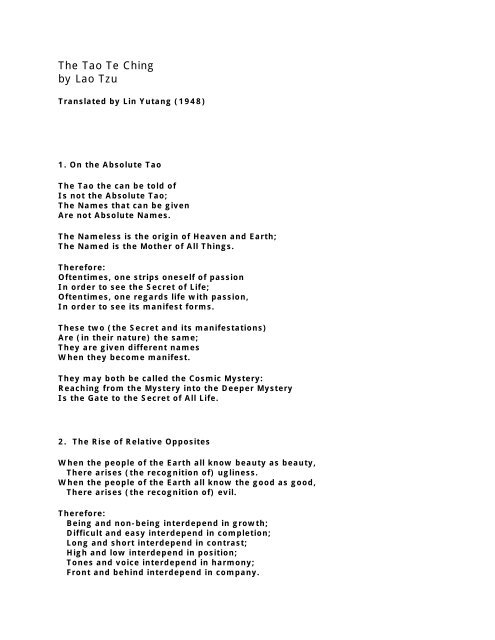
The semantics of this Chinese word resemble English virtue, which developed from the Italian virtù, an archaic sense of "inner potency" or "divine power" (as in "healing virtue of a drug") to the modern meaning of "moral excellence" or "goodness". 德 ( pinyin: dé Wade–Giles: tê²) means "virtue", "personal character", "inner strength" (virtuosity), or "integrity". This term, which was variously used by other Chinese philosophers (including Confucius, Mencius, Mozi, and Hanfeizi), has special meaning within the context of Taoism, where it implies the essential, unnameable process of the universe. 道 ( pinyin: dào Wade–Giles: tao⁴) literally means "way", or one of its synonyms, but was extended to mean "the Way". The Chinese characters in the title ( simplified Chinese: 道德经 traditional Chinese: 道德經 pinyin: Dàodéjīng Wade–Giles: Tao⁴ Tê² Ching 1) are:

In English, the title is commonly rendered Tao Te Ching / ˌ t aʊ t iː ˈ tʃ ɪ ŋ/, following Wade–Giles romanization, or Dao De Jing / ˌ d aʊ d ɛ ˈ dʒ ɪ ŋ/, following pinyin. 2.2 Historical authenticity of the author.Its influence has spread widely outside East Asia and it is among the most translated works in world literature. Many artists, including poets, painters, calligraphers, and gardeners, have used the Tao Te Ching as a source of inspiration. It also strongly influenced other schools of Chinese philosophy and religion, including Legalism, Confucianism, and Buddhism, which was largely interpreted through the use of Taoist words and concepts when it was originally introduced to China.


The Tao Te Ching, along with the Zhuangzi, is a fundamental text for both philosophical and religious Taoism. The oldest excavated portion dates back to the late 4th century BC, but modern scholarship dates other parts of the text as having been written-or at least compiled-later than the earliest portions of the Zhuangzi. The text's authorship, date of composition and date of compilation are debated. The Tao Te Ching ( UK: / ˌ t aʊ t iː ˈ tʃ ɪ ŋ/, US: / ˌ d aʊ d ɛ ˈ dʒ ɪ ŋ/ simplified Chinese: 道德经 traditional Chinese: 道德經 pinyin: Dàodé Jīng ( listen)) is a Chinese classic text traditionally credited to the 6th-century BC sage Laozi.


 0 kommentar(er)
0 kommentar(er)
